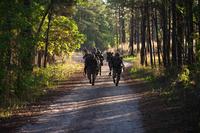The Army in Korea mainly escaped the first round of sequester budget cuts but was bracing for the fallout on readiness, training, and support during a crisis in the coming year, the new commander of U.S. Forces Korea said yesterday.
Security on the Korean peninsula was given a high priority by defense planners when the sequester process took $37 billion out of military budgets in 2013.
"We've been fortunate, we've seen little impact," said Army Gen. Curtis Scaporrotti, who took over as head of U.S. Forces Korea on Oct. 2.
"We're just starting to see some of the impacts" of sequester, primarily in cutbacks of outreach activities to Korean communities, Scaparrotti said at a forum on the Army's role in the Pacific at the Association of the U.S. Army's Meeting and Exposition.
His main concern was coping with the projected $52 billion in cuts for the Defense Department from another round of sequester cuts beginning in January. Scaparrotti said he is worried about the level of support and readiness of forces during a crisis on the peninsula, said Scaporrotti, who also heads the United Nations Command and the South Korea-U.S. Combined Forces Command.
"I rely heavily on forces coming to me through USARPAC (U.S. Army Pacific)" in the event of an attack by North Korea, Scaporrotti said. "We know those have been impacted [by sequester]."
Army Gen. Vincent Brooks, commander of USARPAC, said that when it came down to getting troops from his units in Hawaii and Alaska to support Scaporrotti, he was more worried about the impacts of sequester on the Air Force.
"We've got to be aligned with somebody to fly us" to Korea during a crisis, Brooks said. Without sufficient funding, "we're putting our commitments to our friends at some risk," said Brooks, who joined Scaporrotti at the podium.
Brooks said he was engaged in near daily videoconferences with the Pentagon on how to deal with the effects of the budget cuts on the Army's role in the rebalance of forces to the Pacific.
"The full impacts have yet to show," Brooks said. He noted that he has already had to cancel a long-scheduled training exercise with Japan.
"It puts at risk even bigger exercises" planned in the region next year, Brooks said.
Scaporrotti faces major upcoming costs that could be impacted by sequester in the planned re-alignment of U.S. forces to bases south of Seoul through 2016. This will involve new construction at Camp Humphreys, which will become the main hub of U.S. forces in Korea.
South Korea and the U.S. are also involved in negotiations on the scheduled December 2015 handover of wartime operational control of all troops on the peninsula to South Korea. Currently, Scaporrotti would be in command of all allied forces on the peninsula in the event of war.
During his Senate confirmation hearings, Scaporrotti said he favored going forward with the handoff to the South Koreans of operational control but he declined comment on whether the re-alignment of U.S. forces south of Seoul should be delayed because of budget concerns.
The unpredictable regime in Pyongyang required constant vigilance, Scaporrotti.
"The threat is real and apparent to everybody," said Scaporrotti, adding that the North Koreans continue to improve their long-range artillery and missiles, and "continjue to work their nuclear technology."
Conflict could be triggered by an unlikely event, Scaporrotti said. Right now, his concern is crustaceans. It's the blue crab season in the waters around contested islands off Korea's western coast near the De-Militarized Zone, Scaporrotti.
"There are 400 boats out there" going after blue crabs, plus ships from the Chinese, North Korean and South Korean navies monitoring the fishing fleets, Scaporrotti said in warning of the ever-present possibility of a confrontation that could get out of control





























